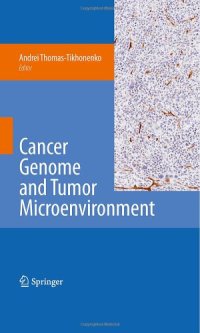
Ebook: Cancer Genome and Tumor Microenvironment
- Genre: Biology // Ecology
- Tags: Cancer Research, Oncology
- Series: Cancer Genetics
- Year: 2010
- Publisher: Springer-Verlag New York
- Edition: 1
- Language: English
- pdf
Oncogenes and tumor suppressor genes had been traditionally studied in the context of cell proliferation, differentiation, senescence, and survival, four relatively cell-autonomous processes. Consequently, in the late ‘80s-mid ‘90s, neoplastic growth was described largely as a net imbalance between cell accumulation and loss, brought about through mutations in cancer genes. In the last ten years, a more holistic understanding of cancer slowly emerged, stressing the importance of interactions between neoplastic and various stromal components: extracellular matrix, basement membranes, fibroblasts, endothelial cells of blood and lymphatic vessels, tumor-infiltrating lymphocytes, etc . Nevertheless, the commonly held view is that changes in tumor microenvironment are "soft-wired", i.e. epigenetic in nature and often reversible. Yet, there exists a large body of evidence suggesting that well-known mutations in cancer genes profoundly affect tumor milieu. In fact, these cell-extrinsic changes might be one of the primary reasons such mutations are preserved in late-stage tumors. Cancer Genome and Tumor Microenvironment reviews how tumor microenvironment and progression can be "hard-wired", i.e. genetically controlled.
Oncogenes and tumor suppressor genes had been traditionally studied in the context of cell proliferation, differentiation, senescence, and survival, four relatively cell-autonomous processes. Consequently, in the late ’80s-early ’90s, neoplastic growth was described largely as an imbalance between net cell accumulation and loss, brought about through mutations in cancer genes. In the last ten years, a more holistic understanding of cancer has slowly emerged, stressing the importance of interactions between neoplastic and various stromal components: extracellular matrix, basement membranes, fibroblasts, endothelial cells of blood and lymphatic vessels, tumor-infiltrating lymphocytes, etc. The commonly held view is that changes in tumor microenvironment are “soft-wired”, i.e., epigenetic in nature and often reversible. Yet, there exists a large body of evidence suggesting that well-known mutations in cancer genes profoundly affect tumor milieu. In fact, these non-cell-autonomous changes might be one of the primary reasons such mutations are preserved in late-stage tumors.